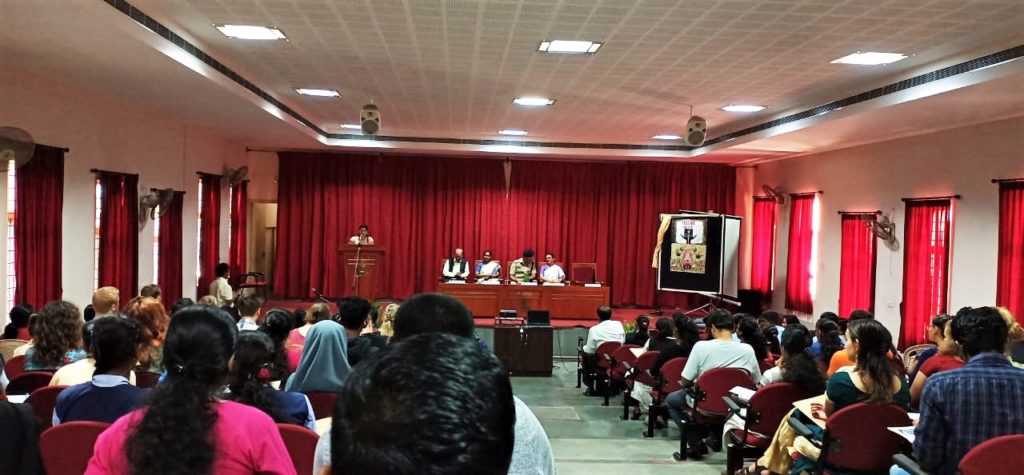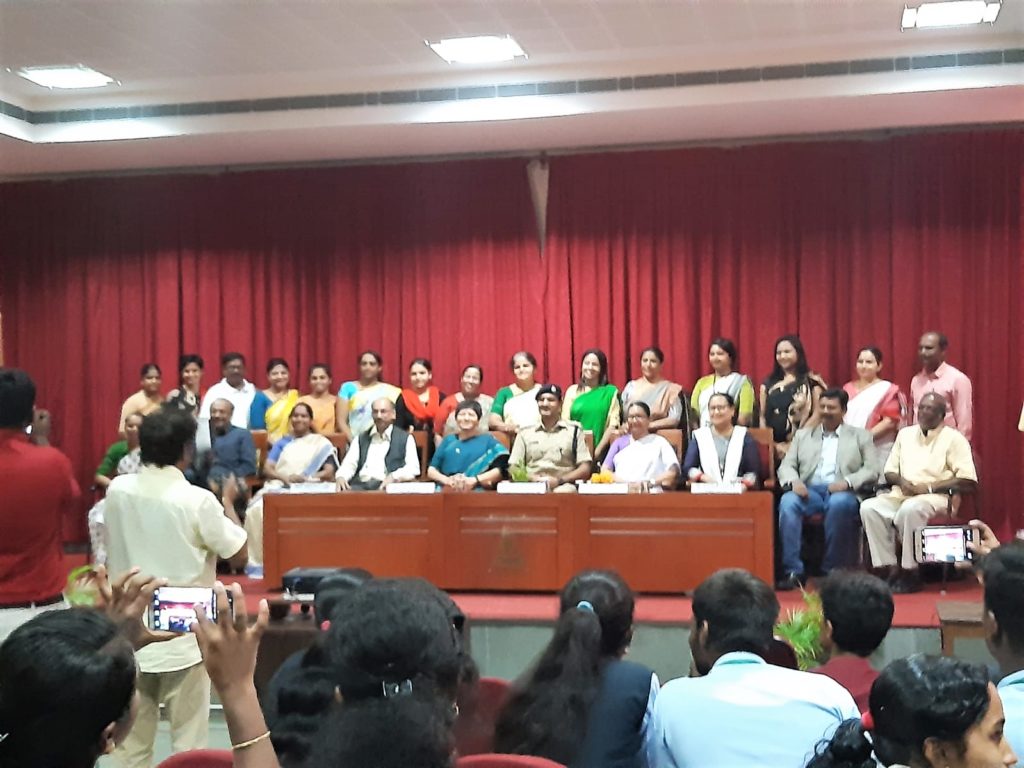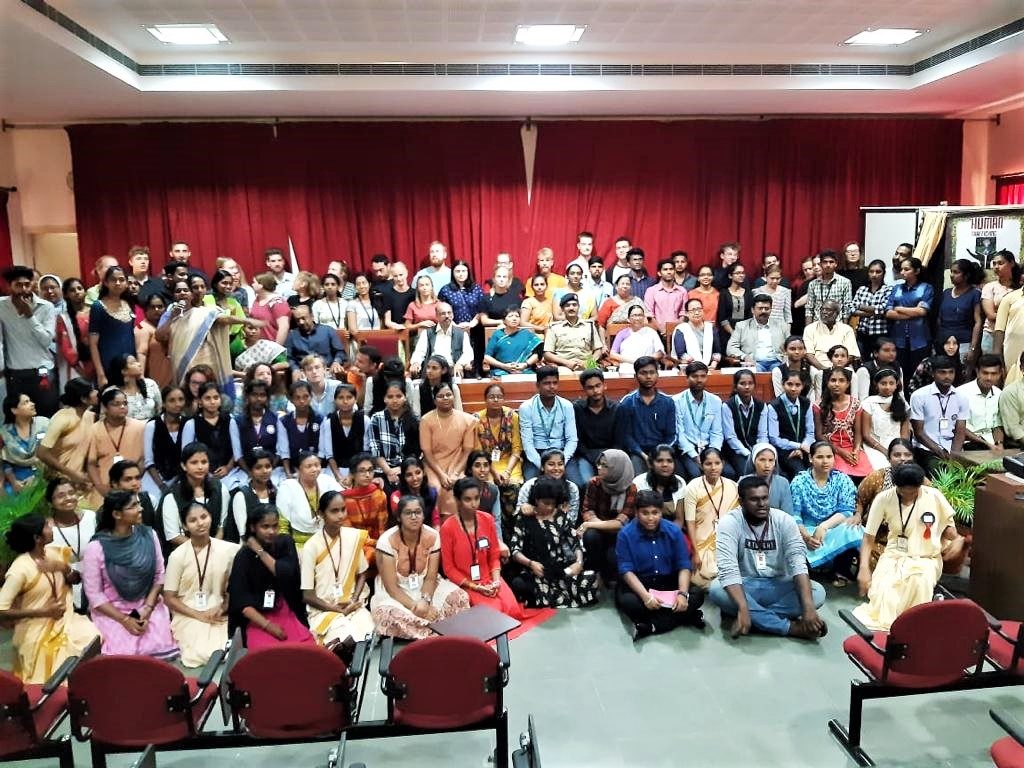
Human Trafficking Session at Roshni Nilaya, Mangalore
On 10th December 2019, the School of Social Work at Roshni Nilaya, Mangalore invited FSL India and its volunteers to the one-day Seminar on “Human Trafficking: Challenges & Responses“. Almost 100 students from several colleges, and our volunteers from Sweden, France, Italy, Norway and Germany participated.
It was a beautiful coincidence that 10th December was the international “Human Rights Day”. The session was opened by some students in traditional clothes that made an emotional performance about the act of human trafficking. It was followed by a welcoming part, where the Assistant Superintendent of Mangalore police, Mr. Srinivas Gowda and the Director of the school symbolically broke the chains to reveal a collage.
Mr Srinivas Gowda gave the definition of human trafficking and shared his experience about human trafficking. It was surprising that some cases happened in Mangalore itself just recently. He insisted on our responsibility and roles in protecting the victims and working against human trafficking.

The first lecture was held by Ms Mungreiphy Shimray who is from New Delhi. She talked about the history of human trafficking. In that context, she mentioned the term “Modern slavery in India” and referred to the fact that it is the 2nd largest criminal industry. Additionally, she showed the process of human trafficking from recruitment over transportation, to exploitation and how it is a form of migration. At the end, she suggested to reduce poverty, reduce the demand, educate people on the danger, engage with youth and manage migration.
There was a short break, and one of the students sang a song that matched the general topic.
In the second lecture, Mr. Emmanuel Angelo talked mainly about the problem of prostitution and forced labour of human trafficking. The lowest one can pay for a prostitute, for e.g. is just Rs 10. He mentioned the different locations where these forms of human trafficking occur. Moreover, he talked about how victims get tricked into it by fake job offers, marriage proposals, and love affairs via the internet, kidnapping or professional photo shoots (false photographer). With the internet, it has become easier to choose a victim or get access to the human trafficking business. He finished with the importance of prevention, protection and prosecution.
After the lunch, the third session of Dr A J Christopher started. His lecture focused on the prevention of human trafficking. He especially stressed that the students who study social work will be the social workers of tomorrow. He advised the students to pay attention to their environment and the people around them.
For the last part of the day, there five discussion groups were made. Each group got a topic about protection, prosecution and prevention. One group leader was chosen to present the discussion afterwards.
At the end of the seminar, the whole day was summarised, and all of the participants got a certificate for their newly gained knowledge.

The seminar was very interesting and rewarding. It was nice to listen, and to encounter different perspectives about the topic. Thanks to the School of Social Work for inviting and sensitising us about the topic.
Some feedback from our volunteers:
Miriam, STC: I enjoyed the seminar. It was interesting and we got some nice food. I liked that they had some performances in between and talked about cases that happened in the region. Next time, they should try to keep some more time for the discussion part.
Rosana, STC: The seminar was quite interesting. It is a pity that they had to cut the workshop short because half an hour wasn’t nearly enough to discuss such an important matter. I really liked the different approaches of the speakers, though maybe I would’ve like to hear something more practical about the possible solutions (what is being done at the moment to fight against human trafficking, or something like that).
Algle, STC: I really loved the seminar. It was very interesting especially the first two lectures, because I learned so much and I was able to complete my knowledge on human trafficking. The organisation and food was good, too. But I did not like group discussions, because nobody spoke, and it was complicated to understand. The seminar was really good!
Gerrit, STC: The Human Trafficking session in Mangalore was interesting. The presentations were giving a general insight into the issue, but didn’t go into too much detail on how to fight human trafficking. In my opinion, they wasted a lot of time on the inaugural (90 min!) and other formalities. The group discussions at the end were a nice idea, but in my opinion, the groups were too big and the questions to discuss ambiguous. Therefore, we had very little input, at least in my group. The building was modern and comfortable, the food very tasty.
Victoria, EE: Interesting topic with inspiring and encouraging speakers talking about real life examples. As previous volunteers made notes on, I would have appreciated more time to address efforts being made to find solutions and dealing with the problem. For example: What has worked in the past and what needs to improve?
I felt there should also have been more problematising of the CCTV community and always “suspecting everyone”. There are many theories suggesting that a community that is built on trust and has more equal opportunities for everyone is less criminalised, for example. Walking around pointing fingers is (in my opinion) putting out fires, but why was there a fire in the first place? The last speaker was getting there, but he didn’t get to say much, since his session gave time to the group discussion, and it felt that his point didn’t really stick to the audience (given the presentation of group discussions).
Discussions could have been conducted in smaller groups, to be more fruitful. People hesitated to share their minds in such a big group and time was short.

Joel Hannin, Varanasi Farm: The Seminar took from 9:30 till 4:00 pm, with quite an international audience, with Indian students, Norwegians and us German FSL Volunteers.
Charlotte Eisvogel, Niveditha School: Was nice. The second speaker was far better than the first one. And the groups in the last session were still a bit too big, so that was a problem, I guess. But all in all, it was good to be reminded of it again, and to get some input and stories.
Daria, Varanasi Farm: It was a very interesting seminar, because I became aware how present the topic of human trafficking is. We got important input from the speakers and some real-case examples. Still, we were late by 1 hour, because of the long introduction. The speeches could have been shorter in some parts. All in all, I am glad to have attended this seminar, because we did not only gain knowledge, but could also discuss about solutions with students and other participants.
Leo, Open Camp: I appreciated to attend this seminar. It was quite well arranged. I liked especially the first 2 sessions in the morning, well explained with a satisfying panoramic of the issue, with facts and statistics. The afternoon session on my opinion was quite demagogic. The workshop was a good idea, but pointless. They/we tried to give theorical solutions that is fine, but I reckon that such a huge problem can be solved starting from the root, with the education and awareness of people, starting from the primary school!
Jan M, Regular Teaching: The program was really interesting it was a new theme for me, and I think most of us and therefore very informative it was good to get sensitised. Thanks for the opportunity to engage in that seminar.